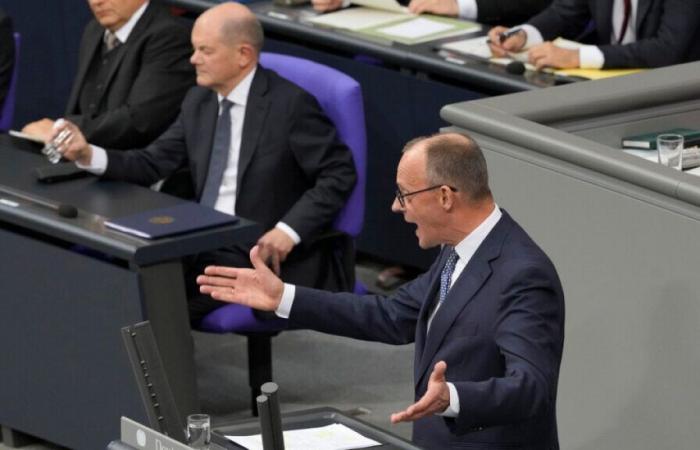Germany’s main opposition party is favored in the polls in the February 2025 elections. The program was presented on Tuesday: more investments in defense and security expected
ADVERTISING
The German Christian Democratic Union (CDU) announced on Tuesday its program for the early elections on February 23, in which it proposes to adopt a tough position on immigration, increase public spending on defense and security and to reduce taxes.
The party, currently in opposition in Germany and led by former investment banker Friedrich Merzseems close to a return to power, leading the polls with around 30 percent of voting intentions.
What does the CDU propose if it returns to government in Germany
The CDU program seems to want to move Germany further to the right, in particular on the issue of immigration, where it proposes a break not only with the current government but also with Angela Merkel, former leader of the party, who governed the country for 16 years.
Among other measures, the Christian Democratic Party calls for stricter asylum policy and a de facto freeze on the reception of migrants. These policies could be difficult to implement, as European rules state that member countries have the obligation to examine asylum applications once the applicant is on EU territory.
National authorities can refuse entry to asylum seekers if they pose a danger, but the European Commission has the prerogative to intervene. However, for years migrants from Greece to Poland have been pushed back without interference from Brussels.
In particular, the CDU proposes to: designate more countries of origin as “safe”in order to deport migrants more efficiently; to evaluate the outsourcing of asylum procedures to third countries and to reduce cash benefits for asylum seekers who have been told to leave Germany; and to change the law at European level, a move that would see Berlin join the conservative turn on migration and asylum policy that has affected various member states including Italy.
According to the party, these measures would serve to curb the “inflow” of people into Germany defined as “excessive” and at the same time to speed up the processing of visas for qualified foreign workers, which the national economy urgently needs.
The program also includes a proposal to reverse the dual nationality policy introduced in the past, a change which for asylum seekers would see the German passport become “the end of the integration process, not the beginning”.
Germany elections, the CDU program on Ukraine, security and welfare
The CDU promises to inject “at least” 2 percent of the country’s gross domestic product into the armed forces, in line with NATO’s defense spending obligation, while improving defense procurement cooperation with the rest of Europe.
“We are equipping the Bundeswehr to return to being fully capable of defending themselves,” we read in the program.
Under the leadership of Olaf Scholz, Germany has already reached the 2 percent threshold for military spending. However, despite the modernization of the army that began after Russia’s invasion of Ukraine in 2022, the German armed forces were described in an annual assessment, published in February this year, as obsolete.
The Christian Democratic Union reiterated its support for Ukraineincluding the continuation of arms supplies, and Merz is taking a more clear stance towards Russia than Scholz.
The chancellor candidate would, for example, give the green light to the use of the long-range Taurus missiles, denied so far by Berlin, albeit in the press conference to present the program on Tuesday Merz implied that a country at war like Ukraine cannot become a member of NATO.
Domestically, Merz has proposed strengthening security by installing video cameras and facial recognition software, clearing out mosques where “hate and anti-Semitism” are practiced, and fighting extremism on both the right and the left.
As for the faltering German economy, which has seen two years of poor growth, the CDU blames the previous government for having pushed the country “into recession”.
How to revive the economy according to the German opposition
The party’s program proposes to reduce corporate tax to 25 percent, to increase the maximum tax rate to 80 thousand euros, to reduce VAT in the catering sector and, above all, to maintain the limits set by the Constitution itself on budget deficit that Scholz would have liked to reform to increase public spending.
Merz also proposed broad changes to Germany’s subsidy systemsupporting the need for a new welfare system that replaces the current one under which the unemployed receive a minimum of 402 euros per month.
Instead of unemployment benefits, the party plans to provide more support for job seekers, including language courses and more efficient job centres.






